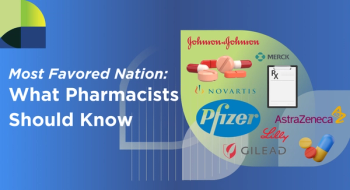
- September/October 2016
- Volume 7
- Issue 5
Partnered for Postgraduate Success – SPT & MSPBA
The University of Pittsburgh’s Masters of Science in Pharmacy Business Administration program catalyzes the critical skills and expertise necessary for students to reach their professional goals.
Over the last several weeks, the Specialty Pharmacy Times website has featured an influx of original content surrounding various aspects of the specialty pharmacy industry.
These articles were authored by students in the University of Pittsburgh’s Masters of Science in Pharmacy Business Administration (MSPBA) program. This inaugural cohort of students is participating in the Specialty Pharmacy Management track of our curriculum, and we are honored to partner with Specialty Pharmacy Times to share insights into the industry.
What is the MSPBA degree, you ask?
In response to the growing demand for leadership development in the business of medicine the University of Pittsburgh School of Pharmacy, in partnership with the Joseph M. Katz Graduate School of Business, has established this new postgraduate program for specialty pharmacy. The first of its kind in the United States, this 12-month program enables working professionals to earn a graduate degree in a flexible, executive-style, real-world manner.
The curriculum is designed to catalyze the critical skills and expertise necessary for students to reach their professional goals, as well as to accelerate career development. Graduates of the MSPBA program are prepared for highly competitive leadership and administrative positions in this rapidly-growing area of the health care business.
“The MSPBA program isn’t for everyone,” said Gordon Vanscoy, PharmD, CACP, MBA, chairman and CEO of PANTHERx Specialty Pharmacy. “It’s for individuals striving to be leaders in the business of medicines.”
Guided by C-suite executives, with both extensive and diverse industry experience, students acquire the relevant knowledge and skills to innovate and lead change within the pharmacy industry and beyond. The curriculum focuses heavily on the most relevant components of both business administration and pharmacy administration.
Students personalize their degree by choosing an area of specialization in either community pharmacy, health-systems pharmacy, or specialty pharmacy. Although dual-degree programs offered by The American Association of Colleges of Pharmacy-accredited schools of pharmacy continue to increase in number (72 masters-level programs as of the current annual report1), most typically allow students to complete their master’s degree simultaneously with their doctor of pharmacy curriculum.
The MSPBA differentiates itself by allowing established professionals to utilize their real-world experiences to expand their business savvy, as it relates to their own personal and professional development. MSPBA candidates meet every other Friday and Saturday for 12 months, fulfilling 36 credits necessary to obtain the degree. Additionally, industry experts have recognized the MSPBA program as an avenue to train future leaders for their respective organizations.
“This is a time when pharmacy is being reinvented to have a more active, supportive role in a changing health care landscape,” said Larry Merlo, president and CEO of CVS Health. “CVS Health is proud to be a part of the MSPBA program and its efforts to supply the executive talent we need to rise to the challenge.”
Experts recognize that pharmacy is not just a career, but that it is also a business. Educated leaders with pharmacy business acumen are essential to the future of health care.
Similarly, Dr. Vanscoy, who is also the Pitt School of Pharmacy’s associate dean of business innovation, affirms, “The synergy of 2 schools, coupled with a real world design, will produce the specialty pharmacy executives we need to effectively manage our unprecedented growth at PANTHERx Specialty.”
The articles recently published through the Specialty Pharmacy Times website are representative of course content that is intrinsic to the Specialty Pharmacy Management curriculum. Over the course of 2 terms, students are afforded opportunities that enable them to deeply engage in aspects surrounding the growth and change across specialty pharmacy as an industry.
Furthermore, students receive specialized feedback, directly from industry leaders, in content areas unique to this subset of the business of medicines. This includes finance, strategy, accreditation, supply chain, information technology, and HUB services.
This component of the curriculum combines didactic lecture with a question-and-answer series that allows students to garner opinions from key thought leaders. Students are encouraged to relate real-world experiences from their own careers, too.
They compare and contrast, not only best practices, but also the challenges facing the multitude of players that touch the specialty pharmacy space, including payers, manufacturers, and specialty pharmacies themselves. Students are challenged to develop unique content, that is showcased by Specialty Pharmacy Times, surrounding the topics discussed during the biweekly class sessions hosted at the University of Pittsburgh’s campus in Pittsburgh.
Similarly, the community pharmacy area of specialization encourages students to build on an array of market experiences, ranging from independent to chain pharmacies. Students receive first-hand training through a series of onsite visits facilitated by MSPBA industry partners. These visits provide students the opportunity to compare and contrast organizational structure, operations, and business strategy.
Students develop a unique business plan to launch their own pharmacy, providing strategy and financials for growth and expansion. Beginning with the 2017 cohort, a health-systems specialization will be available, building on the same foundations of the MSPBA program. This area of concentration allows for more focused attention to individuals participating in institutional care and the unique challenges faced therein.
Students will take a holistic view of the organization through development of strategy, regulatory compliance, and quality patient care. As the MSPBA continues to expand, additional areas of specialization will be introduced, such as managed care/pharmacy benefit management and pharmaceutical manufacturing management.
A defining aspect of the MSPBA program is that it is not exclusive to pharmacists. This exciting program is open to any professional whose career focuses on the business of medicines. As most C-suite executives in the business of medicines are not pharmacists, the program is designed for any individual who wants to differentiate themselves as a confident leader in health care.
The traditional business curriculum is made relevant with a medicine-specific focus, allowing participants in the program to better address the challenges they face on a daily basis in their own practices. Students immediately apply what they learn in the classroom today into their work environments tomorrow.
A goal of the MSPBA program is to simplify the logistics of education, and expand accessibility and enrollment by methodically transitioning to a virtual classroom. Progress has been made and will enable aspects of the curriculum to be offered online in 2017, without detracting from the quality of the program.
Another future offering involves bundling components of the MSPBA curriculum and providing focused certificate programs to those interested.
Are you ready to lead in the business of medicines? For more information about the MSPBA program, please visit www.mspba.pitt.edu or contact us at 412-648-8565.
Reference
1. http://www.aacp.org/resources/student/pharmacyforyou/admissions/admissionrequirements/Documents/Table%204.pdf
About the Authors
Bridget T. Regan is the director of pharmacy business programs and assistant professor at the University of Pittsburgh School of Pharmacy. She is a graduate of the University of Pittsburgh School of Pharmacy and earned her MBA from the Katz Graduate School of Business. Prior to joining the university, but after receiving her pharmacy degree, Bridget held pharmacy leadership positions in various sectors of the pharmacy industry. She took on the role of staff pharmacist in a community pharmacy before quickly transitioning to hospital/health-system pharmacy as a director of pharmacy, pharmacy and imaging services administrator, and, ultimately, system director of pharmaceutical care. Bridget is a full-time faculty member teaching in the PharmD curriculum and MSPBA program.Jonathan M. Ogurchak is vice president for business operations at PANTHERx Specialty Pharmacy. PANTHERx Specialty is a dually-accredited, national specialty pharmacy focused on transforming lives by delivering medical breakthroughs, clinical excellence, and access solutions to patients afflicted with rare and devastating conditions. Using novel innovations in technology and patient services, PANTHERx reinvent specialty, revolutionizes pharmacy, and redefines care on a daily basis. In addition to his role at PANTHERx Specialty, Jonathan serves as adjunct faculty for the University of Pittsburgh’s MSPBA program, leading the Specialty Pharmacy Management curriculum.
Articles in this issue
over 9 years ago
MHA Specialty Pharmacy Solutionsover 9 years ago
Biosimilars and Follow-on Biologics: A Pharmacist Opportunityover 9 years ago
How the Human-to-Machine Bond is Transforming Health CareNewsletter
Stay informed on drug updates, treatment guidelines, and pharmacy practice trends—subscribe to Pharmacy Times for weekly clinical insights.


























